This article was medically reviewed by Tu Anh Vu, DMD and by wikiHow staff writer, Eric McClure. Dr. Tu Anh Vu is a board certified dentist who runs her private practice, Tu's Dental, in Brooklyn, New York. Dr. Vu helps adults and kids of all ages get over their anxiety with dental phobia. Dr. Vu has conducted research related to finding the cure for Kaposi Sarcoma cancer and has presented her research at the Hinman Meeting in Memphis. She received her undergraduate degree from Bryn Mawr College and a DMD from the University of Pennsylvania School of Dental Medicine.
There are 14 references cited in this article, which can be found at the bottom of the page.
This article has been viewed 141,069 times.
If you have wisdom teeth coming in, don’t worry. The vast majority of people out there have been where you are right now, and you’ll get through this. Unfortunately, you probably have to get your wisdom teeth removed if they’re causing you pain. If they don’t hurt, you should still need to see a dentist just to make sure they aren’t going to cause you any problems in the future.[1] Even if it doesn’t feel all that great right now, understand that almost all of us have dealt with the same problem and the pain won’t last forever.
Steps
Relieving Pain and Cleaning Your Teeth
-
1Take ibuprofen or acetaminophen to ease your pain. Taking over-the-counter pain reliever is the easiest way to manage any symptoms you’re experiencing. For ibuprofen, take 400-600 mg every 8 hours based on your pain level. If you’re taking acetaminophen, take 325-500 mg every 6 hours. Never exceed the daily recommendations as listed on the bottle.[2]
- Acetaminophen may be better if you don’t have any swelling, while ibuprofen is probably the best choice if your jaw feels a little puffy and sensitive. Either option should take the edge off, though.
- Even if your wisdom teeth aren’t causing you pain, you still need to see a dentist. It’s not an emergency or anything, but wisdom teeth can cause a variety of problems down the line and it may be easier to deal with the teeth before they have a chance to start causing trouble.[3]
-
2Rinse your mouth with warm salt water to soothe pain and prevent infections. Pour yourself a small glass of warm water and mix in ½ teaspoon (2.8 g) of salt. Take a sip of the saltwater and swig it around in your mouth. Spit the water out into the sink and repeat as needed. This will help any damaged tissue heal.[4]
- Do not swallow any salt water. Aside from the fact that it isn’t very tasty, salt water isn’t particularly good for your body.
Advertisement -
3Continue brushing and flossing to keep your teeth clean and healthy. It’s important that you continue taking care of your teeth, even if you have some discomfort from the wisdom teeth. Brush your teeth for at least two minutes, twice a day. Floss at least once a day. You can take it a little easy when brushing the back of your mouth if it’s causing you pain, but neglecting your dental hygiene to avoid temporary pain may ultimately lead to complications with your wisdom teeth.[5]
- Use a toothbrush with extra-soft bristles to avoid irritating your wisdom teeth if brushing is causing you pain.
- Temporarily switch to a toothpaste designed for sensitive teeth if your teeth feel especially delicate.
Seeing Your Dentist
-
1Schedule an appointment to have a dentist take a look. Pain or no pain, a dentist needs to take a look at your wisdom teeth. Call your dentist and explain the problem. Schedule your appointment and show up on time to have a professional take a look and assess the situation.[6] In most cases, the dentist will take an X-ray to get a look at the wisdom teeth.[7]
- The main issue with wisdom teeth is that they often don’t have enough space to come in correctly, so the X-ray will indicate whether you may have a problem in the next few months as the wisdom teeth continue to come in.
-
2See your dentist soon if you have symptoms of an impacted tooth. Wisdom teeth tend to get impacted, meaning they’re blocked, breaking your gums, or pushing against other teeth. If you have an impacted tooth, the pain may become worse over time. Impacted teeth are also more likely to lead to gum disease or structural problems. If you think you have an impacted tooth, tell your dentist and ask for an appointment as soon as you can get in.[8] You aren’t in any serious danger, but it’s best to deal with impacted teeth soon. Symptoms of an impacted tooth include:[9]
- Gum inflammation or redness.
- Jaw pain or swelling.
- Bleeding gums.
- Bad breath or an odd taste in your mouth.
- Trouble opening your mouth all the way.
-
3Discuss your options and schedule an extraction procedure if necessary. After they examine your mouth and take an X-ray, the dentist will explain what’s happening with your wisdom teeth. In most cases, they’ll suggest extracting your wisdom teeth, even if your teeth are coming in correctly and they aren’t causing you pain. Go over the options with your dentist and schedule a follow-up appointment.[10]
-
4Take any antibiotics or use mouthwash as prescribed by your dentist. To reduce the odds that you get an infection, your dentist may prescribe an antibacterial mouthwash or antibiotics. Wisdom teeth often irritate the gums in a hard-to-reach part of your mouth, which can increase the odds of an infection. Follow the dentist’s instructions regarding any prescriptions they give you to keep your mouth healthy and pain-free in the time between your initial appointment and the follow-up.[11]
- In extreme cases, your dentist may prescribe pain medication to deal with any intense discomfort you may be experiencing.
Getting the Teeth Removed
-
1Meet with the oral surgeon or dentist to go over the procedure. Your dentist may go over this with you at your initial appointment, or they may refer you to an oral surgeon. Either way, meet with the dental professional to go over the pre-op instructions and the procedure. This is also your opportunity to go over any questions you may have.[12]
- In most cases, you won’t be allowed to eat or drink anything before the procedure. You will also need to arrange for someone to pick you up after the procedure is done.
- Wisdom tooth removal is often partially covered by dental insurance. Sometimes, it’s completely covered. The total cost varies based on the condition of your wisdom teeth, the dentist or surgeon performing the operation, and the type of anesthesia you choose.[13]
-
2Decide if you want to take all of the wisdom teeth out in one sitting. Depending on what’s going on with your wisdom teeth, your dentist may suggest removing all of the wisdom teeth at once. However, they may give you the choice to keep some of the teeth if they look healthy. The option here is entirely up to you, but many dentists believe that it’s best if you just take all of them out to avoid the need for another tooth extraction in the future.[14]
- There are a handful of dental organizations and studies that claim you don’t need to remove healthy wisdom teeth.[15] The choice is entirely yours, but don’t assume you’re making a bad decision by only having 1-2 painful teeth removed and leaving the other wisdom teeth be.
-
3Pick a local anesthetic if you want to be awake for the procedure. In most cases, the dental professional will let you choose the type of anesthetic you’d like to use for the procedure. With a local anesthetic, your mouth will be numb, but you’ll be awake and conscious. You may feel pressure and movement in your mouth, but you shouldn’t experience any pain.[16]
- This is typically the cheapest option.
- You may want to go this route if you don’t like the idea of someone poking around in your mouth without you knowing what’s going on.
-
4Opt for a sedative anesthetic if you want to be a little out of it for the procedure. A sedative won’t make you go to sleep, but you shouldn’t have any clear memory of the procedure when it’s done. You’ll feel calm, pleasant, and drowsy, but you’ll still be conscious.[17] If you dislike heavy sedatives but you don’t want to know what’s going on, a sedative anesthetic is your best bet.[18]
- The price of a sedative anesthetic can vary, but it’s usually cheaper than a general anesthetic.
-
5Choose a general anesthetic if you want no memory of the experience. If you opt for general anesthesia, you will completely lose consciousness before the procedure starts. You will experience no pain and you’ll have no memory of the event. If you’re really grossed out by the idea of your teeth being removed, this is probably the way to go.[19]
- General anesthesia is usually the most expensive option, since it requires additional surgical equipment.
- Wisdom teeth extractions can be pretty intimidating, so it’s perfectly reasonable to prefer a stronger anesthetic for your procedure.
-
6Arrange for someone to pick you up after the procedure. In some instances, you may need someone to pick you up and drive you home after the procedure. Ask a good friend or family member to come to the hospital or dentist’s office at the end of the extraction. You may feel a little out of it after having the teeth removed, so arrange for your chaperone to take you home.[20]
- Wisdom tooth extractions are one of the most common procedures in dentistry. Do your best to not worry in the days leading up to the procedure. You’ll be just fine, and any pain you’re currently experiencing should dissipate once you’ve fully recovered.
- While you may be a little out of it, you shouldn’t experience any serious pain once the procedure is over.
-
7Follow the post-op instructions to avoid complications. After the procedure, keep a gauze pad over the extraction site for 20 minutes. If there’s blood on it after 20 minutes, remove the pad and replace it. A little bleeding is normal, so don’t worry too much. Use ice packs to numb your jaw if you need a little relief and take any pain medication as prescribed.[21]
- If your bleeding won’t go away, get a moist tea bag and bite gently on it. This will help the extraction site clot and it should curb your bleeding.
- Don’t brush your teeth for 24 hours after the surgery.
-
8Take it easy after the extraction and drink plenty of water. Just relax for the first 2-3 days after the procedure. Drink plenty of water (and only water) without a straw to prevent a dry socket, which is a rare complication where the nerve becomes exposed. Stick with soft foods and avoid anything spicy. Once the bleeding and swelling stop, you should be ready to get back to normal. Until then, you’ll also need to:[22]
- Avoid smoking or chewing tobacco.
- Brush your teeth gently after the first 24 hours have passed.
- Avoid strenuous physical activity.
- Avoid messing with or touching the extraction site.
-
9Contact your doctor if you experience any complications. Don’t worry if you have a little bleeding or swelling. This should go away in the first day of recovery. If you feel like you aren’t recovering after 24 hours, contact your dentist to determine if you need to come in for another visit. You may also need to contact your dentist or surgeon if you:[23]
- Have difficulty swallowing or breathing.
- Your bleeding won’t stop or it becomes excessive.
- You have a fever or severe pain that won’t go away.
- You notice any pus or oozing.
- Your face feels numb.
- Your symptoms get worse instead of better.
Expert Q&A
Did you know you can get expert answers for this article?
Unlock expert answers by supporting wikiHow
-
QuestionWhat should I do when my wisdom teeth are coming in?
 Tu Anh Vu, DMDDr. Tu Anh Vu is a board certified dentist who runs her private practice, Tu's Dental, in Brooklyn, New York. Dr. Vu helps adults and kids of all ages get over their anxiety with dental phobia. Dr. Vu has conducted research related to finding the cure for Kaposi Sarcoma cancer and has presented her research at the Hinman Meeting in Memphis. She received her undergraduate degree from Bryn Mawr College and a DMD from the University of Pennsylvania School of Dental Medicine.
Tu Anh Vu, DMDDr. Tu Anh Vu is a board certified dentist who runs her private practice, Tu's Dental, in Brooklyn, New York. Dr. Vu helps adults and kids of all ages get over their anxiety with dental phobia. Dr. Vu has conducted research related to finding the cure for Kaposi Sarcoma cancer and has presented her research at the Hinman Meeting in Memphis. She received her undergraduate degree from Bryn Mawr College and a DMD from the University of Pennsylvania School of Dental Medicine.
Board Certified Dentist
-
QuestionDoes wisdom tooth pain go away?
 Tu Anh Vu, DMDDr. Tu Anh Vu is a board certified dentist who runs her private practice, Tu's Dental, in Brooklyn, New York. Dr. Vu helps adults and kids of all ages get over their anxiety with dental phobia. Dr. Vu has conducted research related to finding the cure for Kaposi Sarcoma cancer and has presented her research at the Hinman Meeting in Memphis. She received her undergraduate degree from Bryn Mawr College and a DMD from the University of Pennsylvania School of Dental Medicine.
Tu Anh Vu, DMDDr. Tu Anh Vu is a board certified dentist who runs her private practice, Tu's Dental, in Brooklyn, New York. Dr. Vu helps adults and kids of all ages get over their anxiety with dental phobia. Dr. Vu has conducted research related to finding the cure for Kaposi Sarcoma cancer and has presented her research at the Hinman Meeting in Memphis. She received her undergraduate degree from Bryn Mawr College and a DMD from the University of Pennsylvania School of Dental Medicine.
Board Certified Dentist There isn't really any home remedy for wisdom tooth pain and it isn't going to go away on its own. You can take an over-the-counter pain medication, like Tylenol or ibuprofen, but the pain is just going to come back. You really need to see a dental professional to figure out how you can solve the underlying problem.
There isn't really any home remedy for wisdom tooth pain and it isn't going to go away on its own. You can take an over-the-counter pain medication, like Tylenol or ibuprofen, but the pain is just going to come back. You really need to see a dental professional to figure out how you can solve the underlying problem. -
QuestionAre impacted wisdom teeth generally removed?
 Pradeep Adatrow, DDS, MSDr. Pradeep Adatrow is the only board certified Dentist, Periodontist, and Prosthodontist in the southern United States. With over 15 years of experience, Dr. Adatrow specializes in dental implants, TMJ treatments, periodontal plastic surgery, surgical and non-surgical periodontics, bone regeneration, laser treatments, and soft tissue and gum graft procedures. He received a BS in Epidemiology and Biostatistics from the University of Alabama and earned his Doctor of Dental Surgery (DDS) degree from the University of Tennessee College of Dentistry. Dr. Adatrow then completed a three-year postgraduate program in periodontics and implantology at Indiana University and went on to complete another three-year postdoctoral program in advanced prosthodontics from the University of Tennessee. He also serves as a full-time professor and the Director of Surgical Prosthodontics at the University of Tennessee. Dr. Adatrow received the Dean's Junior Faculty Award and the John Diggs Faculty Award, and he was inducted into the Deans Odontological Society. He is board certified by the American Board of Periodontology and is a Fellow of the prestigious International College of Dentistry – a feat that only 10,000 others worldwide can claim.
Pradeep Adatrow, DDS, MSDr. Pradeep Adatrow is the only board certified Dentist, Periodontist, and Prosthodontist in the southern United States. With over 15 years of experience, Dr. Adatrow specializes in dental implants, TMJ treatments, periodontal plastic surgery, surgical and non-surgical periodontics, bone regeneration, laser treatments, and soft tissue and gum graft procedures. He received a BS in Epidemiology and Biostatistics from the University of Alabama and earned his Doctor of Dental Surgery (DDS) degree from the University of Tennessee College of Dentistry. Dr. Adatrow then completed a three-year postgraduate program in periodontics and implantology at Indiana University and went on to complete another three-year postdoctoral program in advanced prosthodontics from the University of Tennessee. He also serves as a full-time professor and the Director of Surgical Prosthodontics at the University of Tennessee. Dr. Adatrow received the Dean's Junior Faculty Award and the John Diggs Faculty Award, and he was inducted into the Deans Odontological Society. He is board certified by the American Board of Periodontology and is a Fellow of the prestigious International College of Dentistry – a feat that only 10,000 others worldwide can claim.
Board Certified Dentist & Oral Surgeon If you have an impacted wisdom tooth, your dentist is always going to recommend you have it removed. The reason for this is that impacted teeth tend to become more painful over time if they're left alone, and they could cause serious problems later in life. If you have an impacted wisdom tooth, your best bet is to have it taken out. Try not to worry too much about this; wisdom teeth are often impacted and the procedure to remove them is extremely common.
If you have an impacted wisdom tooth, your dentist is always going to recommend you have it removed. The reason for this is that impacted teeth tend to become more painful over time if they're left alone, and they could cause serious problems later in life. If you have an impacted wisdom tooth, your best bet is to have it taken out. Try not to worry too much about this; wisdom teeth are often impacted and the procedure to remove them is extremely common.
Warnings
- You typically don’t need to schedule a follow-up appointment after a tooth extraction, but you should contact your dentist immediately if you have difficulty breathing or swallowing, a fever, persistent numbness, or any other symptoms that get worse instead of better.[25]⧼thumbs_response⧽
References
- ↑ Tu Anh Vu, DMD. Board Certified Dentist. Expert Interview. 10 April 2020.
- ↑ https://shc.uci.edu/services/dental-services/helpful-suggestions-for-pain-discomfort
- ↑ Tu Anh Vu, DMD. Board Certified Dentist. Expert Interview. 10 April 2020.
- ↑ Tu Anh Vu, DMD. Board Certified Dentist. Expert Interview. 10 April 2020.
- ↑ https://shc.uci.edu/services/dental-services/helpful-suggestions-for-pain-discomfort
- ↑ Tu Anh Vu, DMD. Board Certified Dentist. Expert Interview. 10 April 2020.
- ↑ https://www.todaysrdh.com/why-dental-x-rays-are-needed-are-less-radiation-than-you-think/
- ↑ Tu Anh Vu, DMD. Board Certified Dentist. Expert Interview. 10 April 2020.
- ↑ https://my.clevelandclinic.org/health/diseases/22296-impacted-wisdom-teeth
- ↑ https://my.clevelandclinic.org/health/diseases/22296-impacted-wisdom-teeth
- ↑ https://www.nhs.uk/conditions/wisdom-tooth-removal/
- ↑ https://www.nhs.uk/conditions/wisdom-tooth-removal/
- ↑ https://www.uthscsa.edu/patient-care/dental/services/wisdom-teeth-removal
- ↑ https://health.clevelandclinic.org/qa-is-it-always-best-to-have-your-wisdom-teeth-removed/
- ↑ https://www.sciencealert.com/no-you-probably-don-t-need-to-get-your-wisdom-teeth-removed-ever
- ↑ https://atooth.com/general-anesthesia-vs-local-anesthetic-which-is-better-for-your-wisdom-teeth-removal/
- ↑ https://www.fidleronthetooth.com/wp-content/uploads/Sedation-Infographic-Fidler.pdf
- ↑ https://atooth.com/general-anesthesia-vs-local-anesthetic-which-is-better-for-your-wisdom-teeth-removal/
- ↑ https://www.mayoclinic.org/tests-procedures/wisdom-tooth-extraction/about/pac-20395268
- ↑ http://www.cutillioralsurgery.com/documents/Cutilli%20Oral%20Surgery-PreOperative%20Instructions-%20Wisdom%20Teeth.pdf
- ↑ https://brazosoralsurgery.com/instructions/post-operative-instructions-wisdom-teeth-removal-waco-tx/
- ↑ https://www.mayoclinic.org/tests-procedures/wisdom-tooth-extraction/about/pac-20395268
- ↑ https://www.mayoclinic.org/tests-procedures/wisdom-tooth-extraction/about/pac-20395268
- ↑ https://www.ncbi.nlm.nih.gov/pmc/articles/PMC4979926/
- ↑ https://www.mayoclinic.org/tests-procedures/wisdom-tooth-extraction/about/pac-20395268
About This Article
To deal with wisdom teeth coming in, visit a dentist so they can examine your teeth and decide if extraction or another alternative is right for you. While you're waiting to get professional dental help, you can take pain relievers to ease your pain and reduce inflammation, but make sure not to place any tablets directly on your tooth or gums as this can cause damage. You can also alleviate your toothache by rinsing with salt water every 2 to 3 hours or placing an ice pack on the side of your face where your wisdom teeth are coming in. For more advice from our Dental co-author, including what foods you can eat to reduce your toothache, read on!

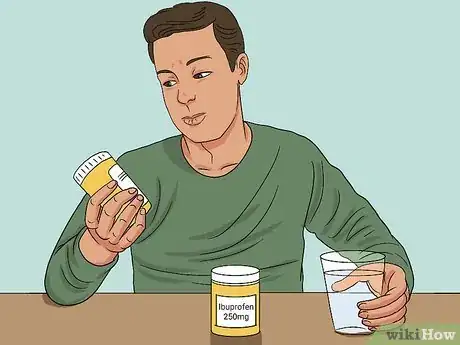
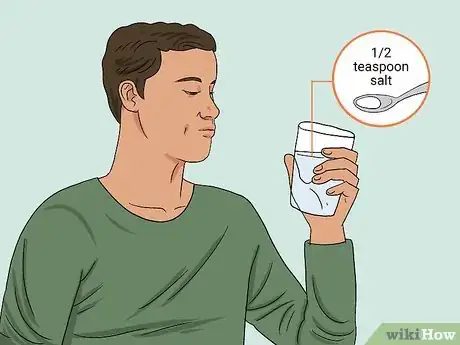

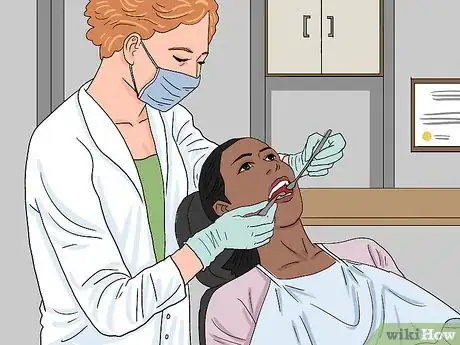

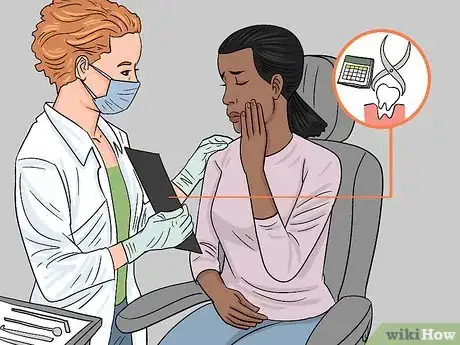

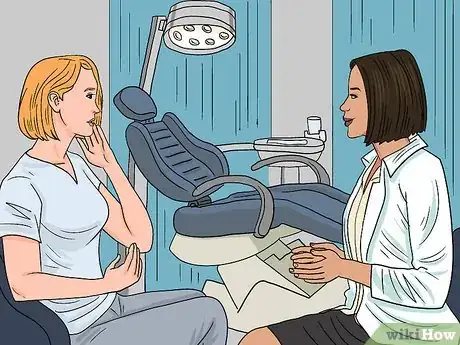
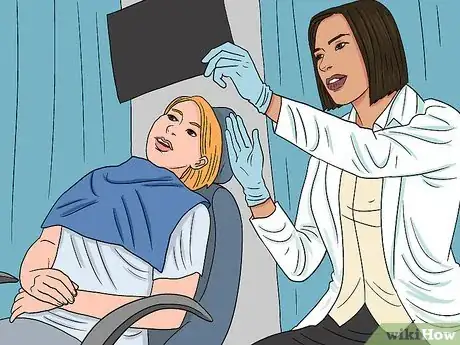
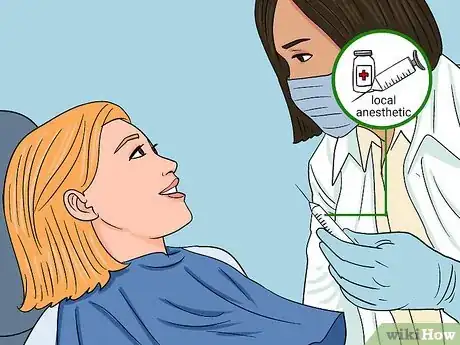
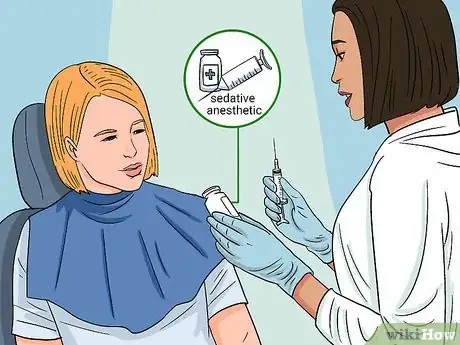
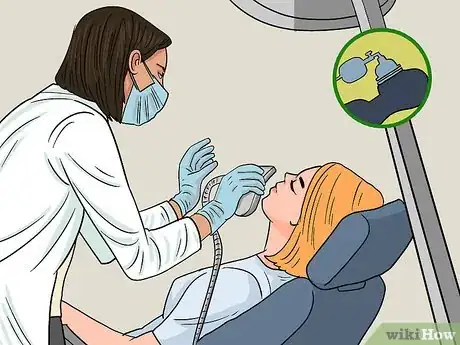

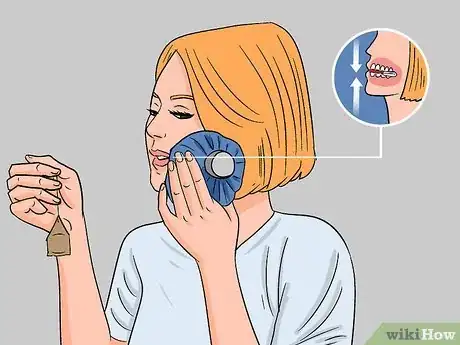

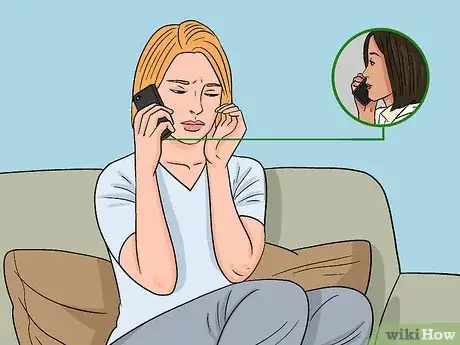


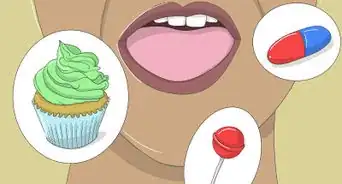
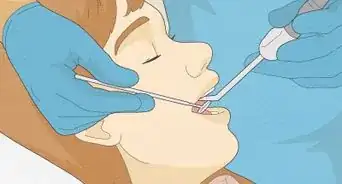
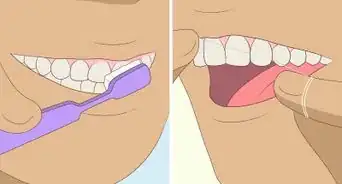
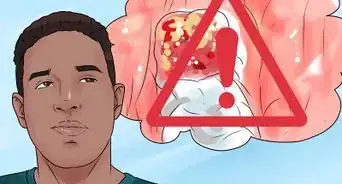


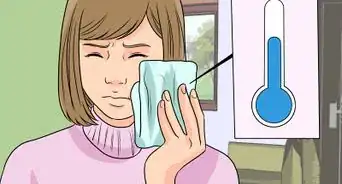

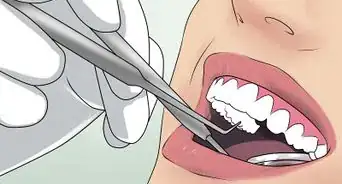
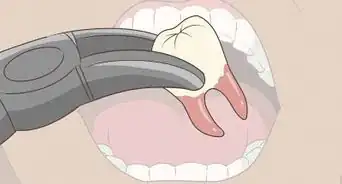











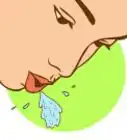




































Medical Disclaimer
The content of this article is not intended to be a substitute for professional medical advice, examination, diagnosis, or treatment. You should always contact your doctor or other qualified healthcare professional before starting, changing, or stopping any kind of health treatment.
Read More...